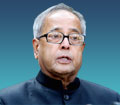
The government Monday released a new comprehensive national policy on narcotic drugs and psychotropic substances in order to curb the illegal drug trafficking through seeking private sector participation in cultivation of poppy and alkaloids.
Unveiling the 'Narcotic Drugs and Psychotropic Substances Policy', Finance Minister Pranab Mukherjee said, "The national policy released today, presents evidence of India's strong commitment and intent to rise to the challenges posed by the drug menace."
With this new drug policy, the government is aiming to combat terror financing and black money generation through illegal trade of drugs.
'Apart from the obvious damage to the health of individuals and society, the illegal drug trade generate quantum of money that is used for various criminal activities including terror financing and other forms of trans-national organised crimes,' said FM.
'The policy attempts to curb the menace of drug abuse and contains provisions for treatment, rehabilitation and social re-integration of victims of drug abuse,' he added while commenting about the new drug policy on narcotic and psychotropic substances.
The policy recommends 'production of Concentrate of Poppy Straw (CPS) in India by a company or body corporate'.
"This would enable India to retain its status of a traditional supplier of Opiate Raw Material (ORM) to the rest of world, while remaining competitive," the policy said.
According to new policy, to curb the threatening of illegal drug trade, different ministries and departments of central and state governments would work together.
"Today, the entire mankind is confronted with the problem of drugs in some form or the other. Implementation of the provisions of the policy will lead to reduction of crime, improvement in public health and uplifting of the social milieu," Pranab said.
"While it is difficult to pinpoint the exact numbers, I am told that the UNODC estimates the quantum of global market in illicit drugs to be of the order of several hundred billion dollars," Mukherjee said.
According to a United Nations report released in 2011, between 149 and 272 million people or 3.3 to 6.1 % of the world's population aged 15-64 used illicit substances at least once in the previous year.
"What is more alarming is the fact that this number has increased since the late 1990s. It is obvious that the international community needs to raise the level of response to the challenge posed by drugs, and India, which is home to one-sixth of the global population, has an added responsibility in this regard," said finance minister on UN report.
|
|
Read More: UNODC | United Nations Volunteers | N.t.p.c./sector-10 Faridabad | Govt Seed Form | Govt Press Chandigarh | Govt Degree College Hamirpur | Govt. Medical College | Indore Govt. College | Govt. General Hospital | Govt.gen Hospital | Govt.silk Farm | Govt Stanley Hospital | Govt. College Of Engg | Govt.college Of Technology | R.n. Mukherjee Road | Barrackpore Govt.housing | Mankundu Govt.colony | Salua Govt. Colony | Diphu Govt.college | Govt. Complex | Mon


Comments: